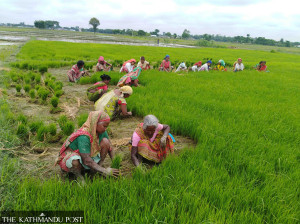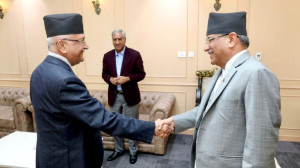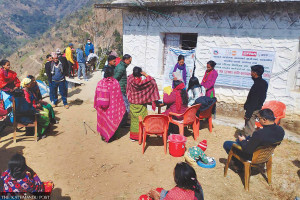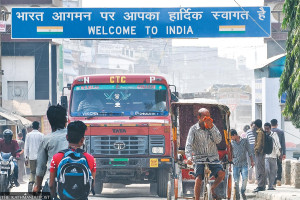 16.12°C Kathmandu
16.12°C KathmanduMovies
A film with much potential
‘Dhak Dhak’ explores the journey of four women seeking self-discovery and companionship. While the movie initially captures the essence of their individuality and friendship, it falters in the later stages, relying on clichés and stereotypes.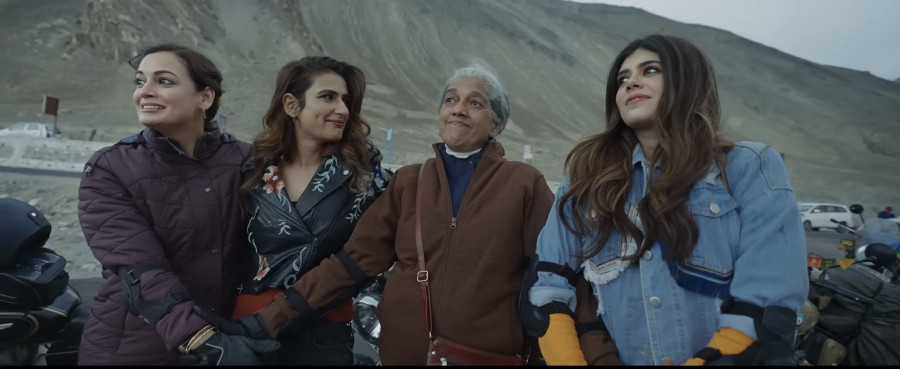
Manushree Mahat
‘Dhak Dhak’ kicks off with promising potential. Four women, each from different walks of life, come together for a journey of self-discovery filled with thrills and self-fulfilment. The film aims to embody the warmth of a close-knit companionship, and in many ways, it succeeds. Friendship becomes the lifeblood of the narrative. However, at times, it feels like the only glue holding the film together, especially as it grapples with issues in its storyline, plot and narrative coherence.
The film starts with Sky (Fatima Sana Shaikh), a bike and travel influencer, shooting a biker gang in action. It becomes evident that Sky is feisty, independent and sharp-witted, saving herself and Prabhi, the grandson of Mahi (Ratna Pathak Shah), from a close call with the police. But her personal life and mental health are in shambles following leaked nude photographs, and subsequent broken relationships that have also severely affected her professional career (whom she shared with her ex-boyfriend).
Sky seeks a change, which comes in the form of Mahi, a 60-year-old tired but daring woman, who has taken to driving a motorcycle for its practicality. What ‘Dhak Dhak’ delivers on is its promising take on the life of each of its four main characters, and Mahi’s character, for me, takes the cake in its multifaceted portrayal of an elderly woman who doesn’t want to be defined by her age. Mahi is tired, lonely, and haunted as she realises that she has been relegated to the role of the old mother, with little companionship from her children, engrossed in their own lives.
For most of the film, Mahi is portrayed as the wise woman who holds the group together despite their opposing dynamics, but we also see her deep desire to break the monotony that defines her life. She also desires companionship and affection, evident in her discreet glances at Bernett (Ozgur Kurt), another biker heading to the same destination: Khardung-La.
What the film falls short in is holding the story together as the group’s journey takes shape. Initially, the personality clash is entertaining. How the guarded and goal-oriented Sky hurls commands at everybody else, constantly irritated by Manjari (Sanjana Sanghi), who is depicted as her exact opposite: timid, scared and mostly unadventurous (someone I wholly related to) is fun to watch. But as is the problem with too many Bollywood films, drama takes centre stage near the end of its second half with a very predictable- and honestly tiring- group confrontation where they all confess the enormity of their friendship and journey.
This is especially disappointing when all four characters actually feel like they are on their way to becoming fully-fleshed people, with their individuality playing as significant as their group dynamics. The first half does this successfully as we are introduced, one by one, to each of the four women. Another main character, Uzma (Dia Mirza), is in an unhappy marriage with a husband who is the definition of misogynistic. She is also a seasoned mechanic, the daughter of a bike company owner, who wishes to be freed from her marriage. While Uzma’s characterisation obviously takes the trajectory of a woman who will come unshackled from her institutional marriage, the director and writers do not seem to know ‘how’ to do this.
The screenplay becomes disordered towards the end, with all the characters facing unexpected challenges. Manjari, who had lied to her family about her location, is confronted by them. Uzma, who similarly deceived her husband, gets arrested after he reports her to the police. Mahi, who had shown little signs of failing health, suddenly collapses. Meanwhile, Sky abandons the group.
The subsequent events are fairly predictable. I firmly believe that a screenplay doesn't necessarily require drama to progress; a more authentic portrayal of human experiences benefits a film more. While each character’s story concludes in a satisfying manner, it lacks sufficient depth for genuine growth.
Not to be completely dismissive, of course, but there are things to look forward to in the film–especially when the group’s dynamics seem to be playing off each other. Sky, who is initially guarded and critical of Manjari, becomes comfortable with the group and sympathetic to her situation. Manjari, who is scared about everything at first, develops confidence and the ability to stand up for herself and others with time. Mahi is happy with her life, and Uzma takes charge of hers.
The cinematography is beautiful, too; the majestically captivating green hills, the alteration between the foggy and sunny days and the emptiness of a land that’s not urbanised are captured in a manner befitting the budding friendship and freedom the group experiences in the hills. The height and the hills are land unchartered by the double-edged sword of modernity and industrialisation, and they serve as the perfect metaphor for these women on their way to ascend unexplored desires in their own lives.
On the opposite end, the soundtrack is entirely too forgettable. ‘Sadke Sadke’ and the titular track, ‘Dhak Dhak’, are catchy enough to listen to a second and third time, especially the former, which quite seamlessly emphasises the overall message of freedom and autonomy in the film. Other songs like ‘Safar Pe Chale’ and ‘Woh Tara’ are good, and blend with the film’s striking cinematography and themes, but none I would come back to listen to again.
Overall, the film attempts to depict a journey of fulfilment but relies heavily on stereotypes and clichés. Its saving grace lies in the genuine moments of friendship, which make it just about entertaining enough to keep watching.
Dhak Dhak
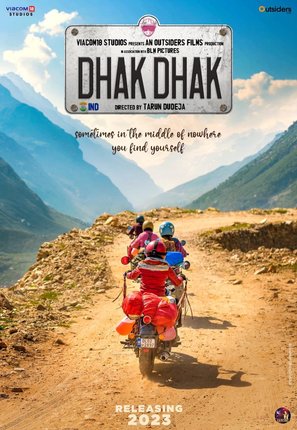
Director: Tarun Dudeja
Cast: Ratna Pathak Shah, Fatima Sana Shaikh, Dia Mirza, Sanjana Sanghi
Year: 2023
Language: Hindi
Duration: 2 hours 17 minutes
Available on: Netflix













